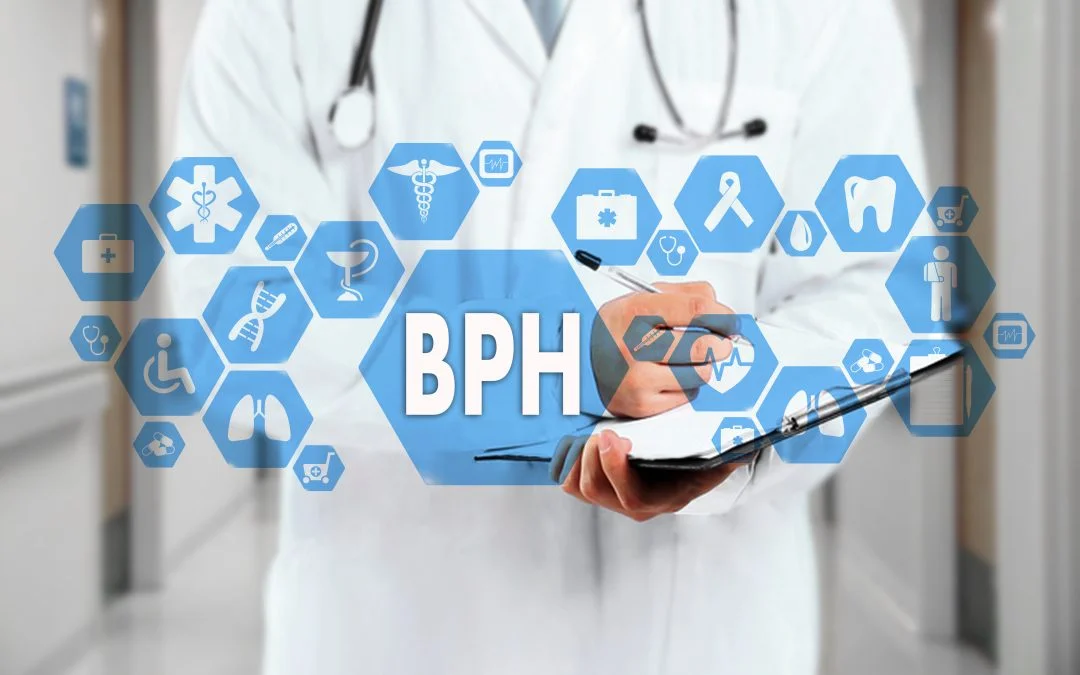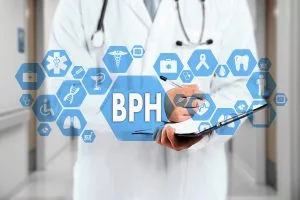
Understanding Benign Prostatic Hyperplasia (BPH)
Prostatic
Here’s what you need to know to understand benign prostatic hyperplasia and how to get treatment for it.
What Is Benign Prostatic Hyperplasia?
Benign Prostatic Hyperplasia is a common condition among men over 50 that affects about one in three at some point. The prostate is a walnut-sized gland located just below the bladder and above the urethra, the tube that carries urine from the bladder to exit your body.
Prostatitis and BPH are two common conditions caused by prostate complications. Both of these conditions can cause urinary difficulties such as hesitance when beginning to urinate or having to get up frequently at night to urinate. These conditions can also be painful, especially in cases involving prostatitis. In addition, both can have serious consequences if not treated properly.
Although these two conditions share some similarities in terms of the symptoms they exhibit, they are distinct. Here we will be focusing on benign prostatic hyperplasia, how it’s diagnosed, and how to treat it.
What are the Signs of Prostatic Hyperplasia?
Signs of prostate enlargement include difficulty urinating, a need to urinate frequently, having to pee in the middle of the night, having to pee in a forceful way, having to push to pee, having to sit down to urinate, etc.
Urinary incontinence is one of the most common signs of BPH. People who experience urinary incontinence often notice a sudden and uncontrollable loss of urine. This can be especially troublesome because incontinence can interfere with daily activities, such as working, attending sporting events, social events, and other important activities. Urinary incontinence can be embarrassing and cause people to limit their activities.
Other signs of prostate enlargement include dribbling after urinating, having to urinate more often (particularly at night), having to wait longer before having another urination, and blood in the urine. If you notice any of these symptoms, you should make an appointment with a urologist as soon as possible.
If you have any of these symptoms and are under the age of 40, you should see your urologist immediately to ensure that the problems you’re experiencing aren’t being caused by something more serious. Prostate cancer is rare in men younger than 40, but it is critical to get evaluated as soon as possible in these cases.
How is Prostatic Hyperplasia Diagnosed?
The doctor will conduct a physical exam of your abdomen and pelvis, as well as a rectal exam. This exam is done by inserting a finger into your rectum. The doctor will feel for enlarged or abnormal tissue, as well as for any lumps in the gland. Although this is often a very quick procedure, it may take a bit longer if any abnormal tissue is detected.
The doctor will evaluate your prostate gland and may take samples of your prostate tissue to rule out cancer. Other tests that may be ordered could include a PSA blood test or a cystoscopy.
Treating Prostatic Hyperplasia
Treating BPH depends on the severity of the symptoms. The most common treatment options include medication, minimally invasive procedures, and surgery. Certain medications can shrink the prostate gland and reduce the symptoms of BPH.
These drugs include alpha-blockers and 5-alpha reductase inhibitors. While urinary incontinence due to BPH can be managed with medications, lifestyle changes, and minimally invasive procedures, you should ask a urologist to help you determine the best option.
Minimally invasive surgical procedures like UroLift are highly effective treatment options for men with BPH, especially when other treatments do not work or are not expected to work. Procedures like UroLift can help eliminate the problems stemming from BPH without subjecting the patient to major surgery.
UroLift works by inserting a small implant that’s designed to keep the tissue from an enlarged prostate out of the way, freeing the blockage to the urethra and alleviating symptoms.
Prostatectomy and BPH
A prostatectomy is a surgery used to treat more severe cases of BPH. The surgeon removes part or all of the prostate gland. Part of the gland is removed if it is inflamed and enlarged. In rare cases, the entire prostate gland is removed if it is cancerous.
These surgeries involve the removal of the prostate gland. Depending on the situation, a section may be removed, or the entire gland. Minimally invasive procedures like UroLift are often preferable as they’re less destructive to the prostate.
Wrapping Up
If you don’t have BPH yet, you should know that there are some things you can do to prevent it or at least reduce your chances of having it in the future. This can be achieved by following a healthy lifestyle of moderate exercise and maintaining a healthy diet.
On the other hand, if you have BPH, you’ll want to get in touch with an experienced urologist and explore treatment options like UroLift. Once you have a game plan, you’ll be well on your way to putting the uncomfortable symptoms of BPH behind you!
Is BPH Affecting Your Quality of Life? Call Z Urology and Make an Appointment!
We know that every case of BPH is unique, which is why we take time to assess each individual case of BPH to recommend the best possible treatment option. At Z Urology, we take the time to listen to you and your concerns. If you are new to our practice, you should know that we have some of the most talented urologists in South Florida on our team.
BPH, while not typically considered to be particularly dangerous, is a serious problem that can affect your quality of life. Once you’re a patient at Z Urology, you will have the confidence of knowing that you will always receive world-class care as our team takes every patient seriously.
Don’t let BPH keep affecting your quality of life, it’s time to call the best urologists in South Florida. It’s time to call Z Urology!
We can’t wait to hear from you!


Recent Comments